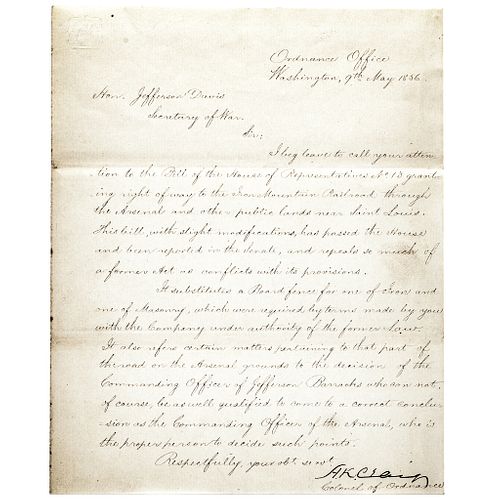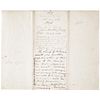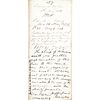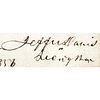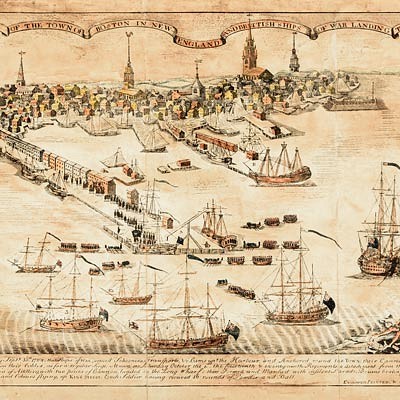1859 JEFFERSON DAVIS Pre Civil War Autograph Note Signed as US Secretary of War
Lot 17
Categories
Estimate:
$1,000 - $1,200
Absentee vs Live bid
Two ways to bid:
- Leave a max absentee bid and the platform will bid on your behalf up to your maximum bid during the live auction.
- Bid live during the auction and your bids will be submitted real-time to the auctioneer.
Bid Increments
| Price | Bid Increment |
|---|---|
| $0 | $10 |
| $200 | $20 |
| $300 | $25 |
| $500 | $50 |
| $1,000 | $100 |
| $2,000 | $200 |
| $3,000 | $250 |
| $5,000 | $500 |
| $10,000 | $1,000 |
| $20,000 | $2,000 |
| $30,000 | $2,500 |
| $50,000 | $5,000 |
| $100,000 | $10,000 |
| $200,000 | $20,000 |
| $300,000 | $25,000 |
| $500,000 | $50,000 |
About Auction
By Early American History Auctions
Mar 20, 2021
Set Reminder
2021-03-20 12:00:00
2021-03-20 12:00:00
America/New_York
Bidsquare
Bidsquare : Autographs-Colonial-Political-Americana
https://www.bidsquare.com/auctions/early-american-history-auctions/autographs-colonial-political-americana-6509
330 Lots of Rare, Historic Autographs, Americana, Civil War Era, George Washington, Abraham Lincoln, Slavery & Black History, Revolutionary War Era, Colonial America, Federal Period, War of 1812, Colonial Currency, Indian Peace Medals & more... Early American History Auctions auctions@earlyamerican.com
330 Lots of Rare, Historic Autographs, Americana, Civil War Era, George Washington, Abraham Lincoln, Slavery & Black History, Revolutionary War Era, Colonial America, Federal Period, War of 1812, Colonial Currency, Indian Peace Medals & more... Early American History Auctions auctions@earlyamerican.com
- Lot Description
Autographs
Jefferson Davis 1856-Dated Pre Civil War Autograph Note Signed as United States Secretary of War Docket Notation
JEFFERSON "JEFF" DAVIS, (1808-1889). American Statesman, U.S. Secretary of War from 1853 to 1857 under President Franklin PiercePresident and Leader of the Confederacy during the American Civil War, serving as the CSA President for its entire history.
May 13, 1859-Dated, Pre Civil War Autograph Note Signed, "Jeffn S Davis" as United States Secretary of War, Very Fine. This signature is on reverse side Docketing portion of a Letter, sent to him from A. K. Craig of the Ordnance Office, Washington, DC, 1 page, measuring 8" x 9.75" which in a light fine tan ink. Jefferson Davis boldly writes in deep brown on the Docket notation, in full:
"The Chief of Ordnance will give further explanation of this case to the comitee (sic) on Mil. Affairs of the Senate. Its history, and probable consequences not only to the Arsenal, but also to the use of the magazine will be clearly presented - (Signed) "Jeffn S Davis" Secretary of War. - Dated May 13, 1856".
Davis is writing in response to Craig's original attached Letter which, in turn, referred to a Bill in the House of Representatives granting right of way to the Iron Mountain Railroad through the Arsenal and other public lands near St. Louis. Apparently, the Bill modified an earlier agreement Davis had struck with that company. This is a nice example of both Jefferson Davis's handwriting and signature prior to becoming the President of the Confederate States of America during the American Civil War.
Jefferson Davis (June 3, 1808 - December 6, 1889) was an American politician who served as the President of the Confederate States from 1861 to 1865. As a member of the Democratic Party, he represented Mississippi in the United States Senate and the House of Representatives before the American Civil War. He previously served as the United States Secretary of War from 1853 to 1857 under President Franklin Pierce.
Davis was born in Fairview, Kentucky, to a moderately prosperous farmer, the youngest of ten children. He grew up in Wilkinson County, Mississippi, and also lived in Louisiana. His eldest brother Joseph Emory Davis secured the younger Davis's appointment to the United States Military Academy. After graduating, Jefferson Davis served six years as a lieutenant in the United States Army.
He fought in the Mexican-American War (1846-1848), as the colonel of a volunteer regiment. Before the American Civil War, he operated a large cotton plantation in Mississippi, which his brother Joseph gave him, and owned as many as 113 Slaves. Although Davis argued against Secession in 1858, he believed that states had an unquestionable right to leave the Union.
Davis married Sarah Knox Taylor, daughter of general and future President Zachary Taylor, in 1835, when he was 27 years old. They were both stricken with malaria soon thereafter, and Sarah died after three months of marriage. Davis recovered slowly and suffered from recurring bouts of the disease throughout his life. At the age of 36, Davis married again, to 18-year-old Varina Howell, a native of Natchez, Mississippi, who had been educated in Philadelphia and had some family ties in the North. They had six children. Only two survived him, and only one married and had children.
Many historians attribute some of the Confederacy's weaknesses to the poor leadership of Davis. His preoccupation with detail, reluctance to delegate responsibility, lack of popular appeal, feuds with powerful state governors and generals, favoritism toward old friends, inability to get along with people who disagreed with him, neglect of civil matters in favor of military ones, and resistance to public opinion all worked against him.
Historians agree he was a much less effective war leader than his Union counterpart, President Abraham Lincoln. After Davis was captured in 1865, he was accused of treason and imprisoned at Fort Monroe in Hampton, Virginia. He was never tried and was released after two years. While not disgraced, Davis had been displaced in ex-Confederate affection after the war by his leading general, Robert E. Lee. Davis wrote a memoir entitled The Rise and Fall of the Confederate Government, which he completed in 1881.
By the late 1880s, he began to encourage reconciliation, telling Southerners to be loyal to the Union. Ex-Confederates came to appreciate his role in the war, seeing him as a Southern patriot. He became a hero of the Lost Cause of the Confederacy in the post-Reconstruction South
Our Auction Contents:
Black History & Slavery: (Lots 1 - 63)
Abraham Lincoln Related: (Lots 64 - 74)
Historic Autographs: (Lots 75 - 235)
Colonial America: (Lots 236 - 261)
Revolutionary War: (Lots 262 - 304)
George Washington Related: (Lots 305 - 306)
Early American Guns & Weapons: (Lots 307 - 318) - Shipping Info
-
Early American provides in-house worldwide shipping. Please contact us directly if you have questions about your specific shipping requirements.
-
- Buyer's Premium



 EUR
EUR CAD
CAD AUD
AUD GBP
GBP MXN
MXN HKD
HKD CNY
CNY MYR
MYR SEK
SEK SGD
SGD CHF
CHF THB
THB